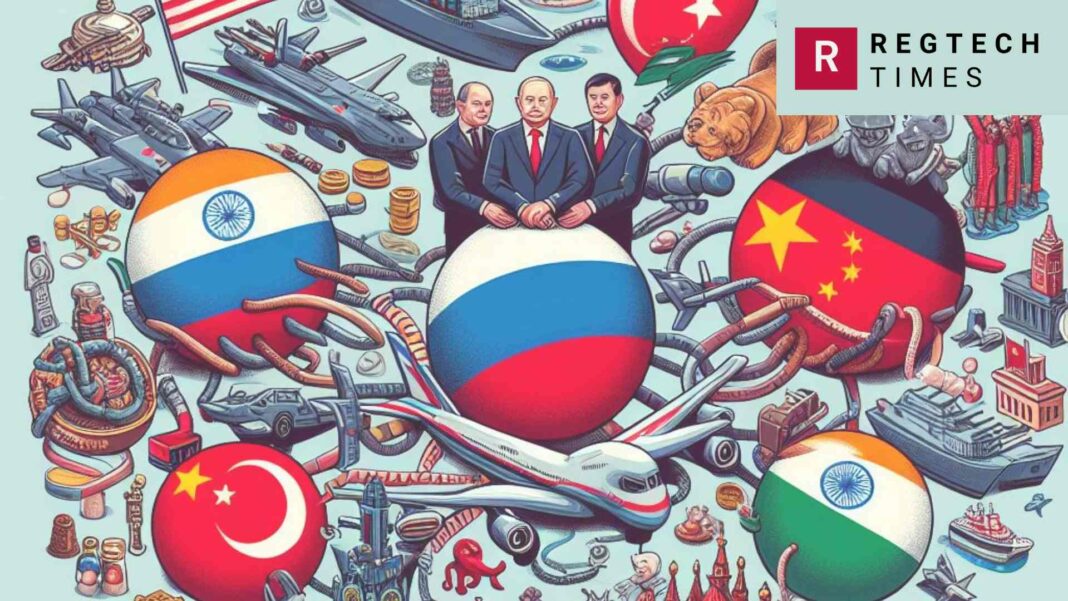Sanctions on the Key Allies of Russia is the new isolation strategy. In the realm of global diplomacy, the chessboard of alliances and allegiances is ever-evolving. Russia, a longstanding player on the geopolitical stage, is currently experiencing a seismic shift in its relationships as a result of escalating US sanctions. This shift, driven by Russia’s ongoing conflict in Ukraine, is causing key allies to reassess their ties with Moscow, creating ripple effects across the international landscape.
A Changing Landscape
Traditionally, Russia has enjoyed close ties with several nations, including China, Turkey, the United Arab Emirates (UAE), and India. However, in the wake of intensified US sanctions, these alliances are undergoing a period of recalibration. The imposition of sanctions by the US government has prompted Russia’s allies to exercise caution in their interactions, mindful of the potential repercussions of secondary sanctions. India is looming under the threat of sanctions after its purchase of Warships from Russia whereas Chiese Banks are facing the threat of sanctions if they support Russian War.
China, in particular, has taken decisive steps to mitigate exposure to US penalties, with major banks curtailing transactions with sanctioned Russian entities. Similarly, countries like Armenia and Kyrgyzstan have distanced themselves by rejecting the Russian Mir payment system, following the suspension of Visa and Mastercard operations in Russia.
India, a significant importer of Russian oil, has also adjusted its approach, signalling a shift away from reliance on Moscow. This cautious manoeuvring reflects a broader trend among Russia’s allies, who are increasingly wary of the consequences of aligning too closely with a sanctioned entity.
The Impact of Sanctions on Key Allies
The US has employed a multifaceted approach to sanctioning Russia, targeting critical sectors of its economy in an effort to undermine its military capabilities and curb aggression. Measures such as freezing foreign exchange reserves and banning Russian oil imports are intended to apply pressure on Moscow and compel a behaviour change.
The consequences of these sanctions are far-reaching, causing disruptions in Russia’s trade and economic relations. Delayed payments for crucial commodities like crude oil and fuel have become commonplace, impacting Russia’s ability to conduct business as usual. The apprehension among banks in China, the UAE, and Turkey underscores the tangible threat posed by secondary sanctions, prompting financial institutions to exercise caution in their dealings with Russia.
Sanctions on key allies of Russia serve several purposes. First, they demonstrate a unified international stance against Russia’s actions, sending a clear message that such behaviour will not be tolerated. Second, they aim to disrupt Russia’s support network and limit its ability to pursue its objectives by forging partnerships with key allies. Third, they seek to impose costs on Russia and its key allies, making it more difficult for them to sustain their activities in the face of economic and diplomatic pressure.
As Russia finds itself increasingly isolated on the world stage, the challenge for its allies lies in striking a delicate balance between maintaining strategic relationships and avoiding entanglement in the web of sanctions. The evolving geopolitical landscape underscores the complexity of global diplomacy and the interconnectedness of international relations.
Looking ahead, the path forward for Russia and its allies is fraught with uncertainty. While the imposition of sanctions has undoubtedly strained relations, it has also created opportunities for dialogue and diplomacy. As nations grapple with the fallout of geopolitical tensions, the need for cooperation and collaboration becomes increasingly apparent.
The current standoff between Russia and the US highlights the intricacies of global power dynamics and the challenges of navigating international relations in an era of heightened tension. As Russia seeks to navigate its isolation and its allies weigh their options, the world watches with bated breath, mindful of the far-reaching implications of this geopolitical chess match.



